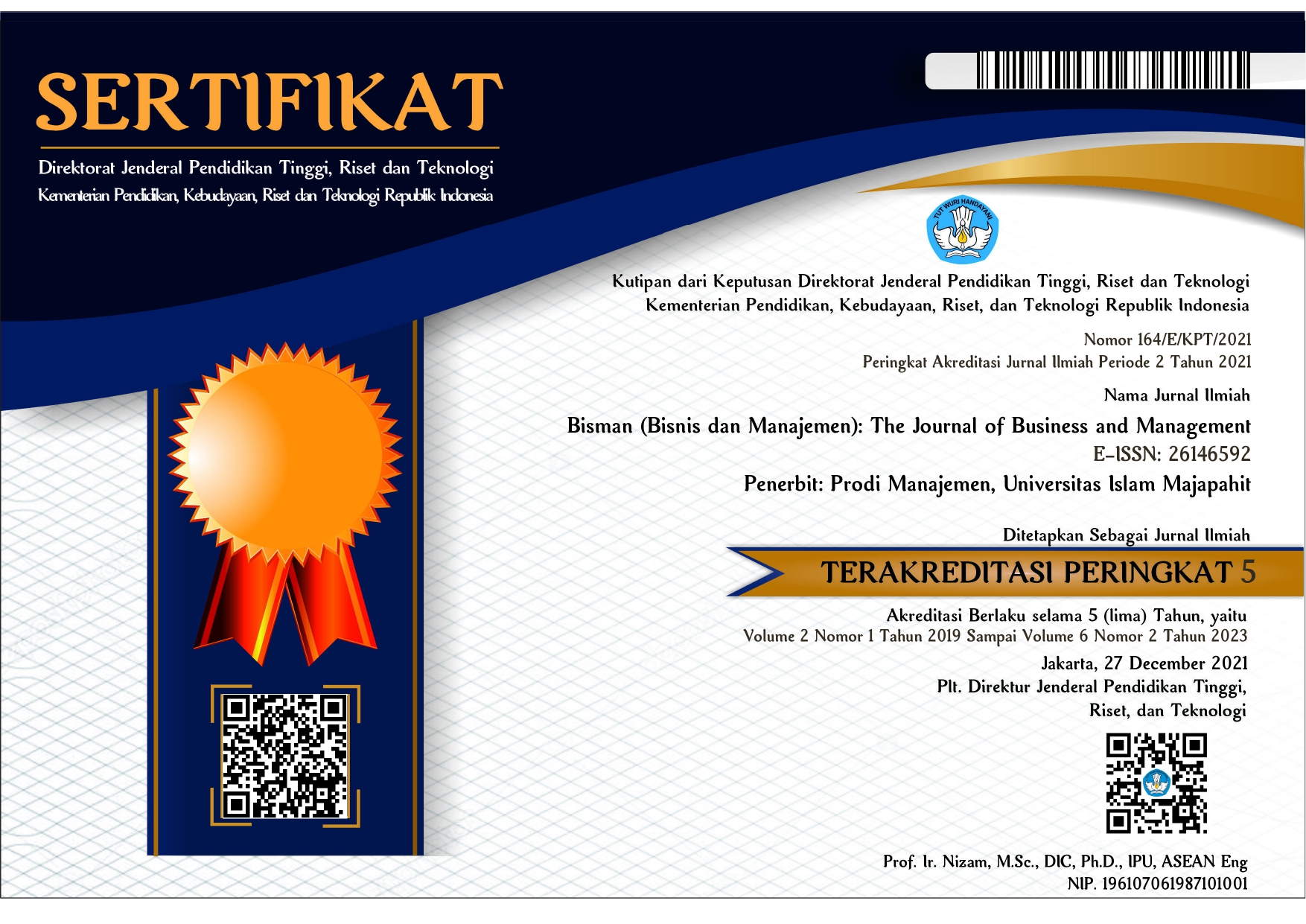The Influence of Transformational Leadership Characteristics on The Creativity of Employees in The Planning Departement Of CV XYZ
Keywords:
transformational leadership, creativityAbstract
The non-repetitive work environment of an organization requires more creative employees in order to provide a high quality service. In the construction service sector, the construction planners have to be able to design a building which not only sophisticated but also conceive a standard security level. The leader in a company has an important role to encourage the creativity of employees. This research is aimed to examine and analyze the influence of transformational leadership characteristics on the creativity of employees. Idealized influence, individualized consideration, inspirational motivation and intellectual stimulation are the independent variables while the employees creativity is the dependent variable. The data used in this research was the primary data that acquired through survey method by disseminating questionnaires. About 119 respondents who work as the employee of the planning department of CV XYZ were used in this research. In this research, a multiple regression analysis was used to analyze the influence of transformational leadership characteristics towards the creativity of employees. The research results mention that there are positive and significant influences of each characteristic of transformational leadership, namely idealized influence, individualized consideration, inspirational motivation and intellectual stimulation on the creativity of employees.
References
Bolino, M. C., & Turnley, W. H. 2005. The Personal Costs of Citizenship Behavior: The Relationship Between Individual Initiative and Role Overload, Job Stress, and Work-Family Con?ict. Journal of Applied Psychology, 90 (4), 740.
Bragger, J. D., Srednicki, O. R., Kutcher, E. J., Indovino, L., & Rosner, E. 2005. Work-Family Con?ict, Work-Family Culture, and Organizational Citizenship Behavior Among Teachers. Journal of Business and Psychology, 20 (2), 303e324.
Cropanzano, R., Rupp, D. E., & Byrne, Z. S. 2003. The Relationship of Emotional Exhaustion to Work Attitudes, Job Performance, and Organizational Citizenship Behaviors. Journal of Applied Psychology, 88 (1), 160e169
Deci, E. L., & Ryan, R. M. 2000. The “What” and “Why” of Goal Pursuits: Human Needs and The Self-Determination of Behavior. Psychological Inquiry, 11(4), 227-268.
Diunduh di http://dx.doi.org/10.1207/S15327965PLI1104_01.
DiPaola, M. F., & Mendes, P. M. 2009. Organizational Citizenship Behaviors in American and Portuguese Public Schools, Measuring The Construct Across Cultures. Journal of Educational Administration, 47 (4), 490-507.
Gomes, D. R., Asseiro, V., & Ribeiro, N. 2013. Triggering Employee Motivation in Adverse Organizational Contexts: “Going the Extra Mile” while Holding Hands with Uncertainty?. Business and Management Research, 2 (1), 41-54.
Diunduh di http://dx.doi.org/10.2224/sbp.2004.32.4.383.
Mas.ud, Fuad. 2004. Organizational Diagnosis Survey Concepts & Applications. Agency Publisher Diponegoro University: Semarang.
Osman, Abdullah, Othman, Yusuf Haji, Rana, S. M., Solaiman, Mohammad dan Lai, Bharat. 2015. The Influence of Job Satisfaction, Job Motivation & Perceived Organizational Support towards Organizational Citizenship Behavior (OCB): A Perspective of American-Based Organization in Kulim, Malaysia. Asian Social Science, Vol. 11, No. 21.
Purnama, Chamdan. 2013. ”Influence Analysis of Organizational Culture Organizational Commitment Job and Satisfaction Organizational Citizenship Behavior (OCB) Toward Improved Organizational Performance”. International Journal of Business, Humanities and Technology, Vol. 3, No. 5.
Robbins SP, dan Judge. 2008. Perilaku Organisasi. Jakarta: Salemba Empat.
Robbins, S. 2006. Organizational Behavior. Translation. Tenth Edition, Index, Jakarta.
Schuler, R. S. 1980. Definition and Conceptualization of Stress in Organizations. Organizational Behavior and Human Performance, April 1980, p.189. Adapted from Robbins (2005).
Singh, Akhilendra K., dan Sigh, Ashok Pratap. 2014. ”Role of Stress and Organizational Support in Predicting Organizational Citizenship Behavior”. The IUP Journal of Organizational Behavior, Vol. IX, No. 4.
Siu, O. 2003. Job Stress and job performance among employees in Hong Kong: The Role of Chinese Work Values and Organizational commitment. International Journal of Psychology. 38, pp 337-247.
Tella, A., Ayeni, C.O., & Popoola, S.O. 2007. Work Motivation, Job Satisfaction, and Organisational Commitment of Library Personnel in Academic and Research Libraries in Oyo State, Nigeria, Library Philosophy and Practice. 1-16.
Ulfah, Maria, Soetioprawiro, Koerniatmanto, Gara, Yudha Panji dan Prasetyo, Adrian Dimas. 2013. Sistem Pertanggungjawaban Hukum Kepolisian Negara Republik Indonesia Secara Organisasional Maupun Personal. Perjanjian No: III/LPPM/2012-09/76-P. Universitas Katolik Prahayangan.
Downloads
Published
Issue
Section
License
Pemberitahuan Hak Cipta
- Seluruh materi yang terdapat dalam situs ini dilindungi oleh undang-undang. Dilarang mengutip sebagian atau seluruh isi situs web ini untuk keperluan komersil tanpa persetujuan dewan penyunting jurnal ini.
- Apabila anda menemukan satu atau beberapa artikel yang terdapat dalam Bisman (Bisnis dan Manajemen): The Journal of Business and Management yang melanggar atau berpotensi melanggar hak cipta yang anda miliki, silahkan laporkan kepada kami, melalui email pada Priciple Contact.
- Semua Informasi yang terdapat di Bisman (Bisnis dan Manajemen): The Journal of Business and Management bersifat akademik. Bisman (Bisnis dan Manajemen): The Journal of Business and Management tidak bertanggung jawab terhadap kerugian yang terjadi karana penyalah gunaan informasi dari situs ini.






